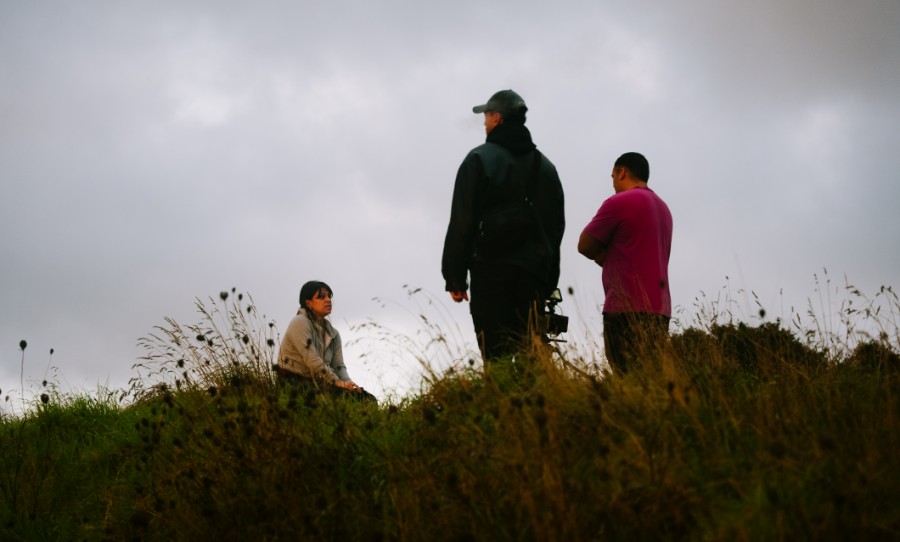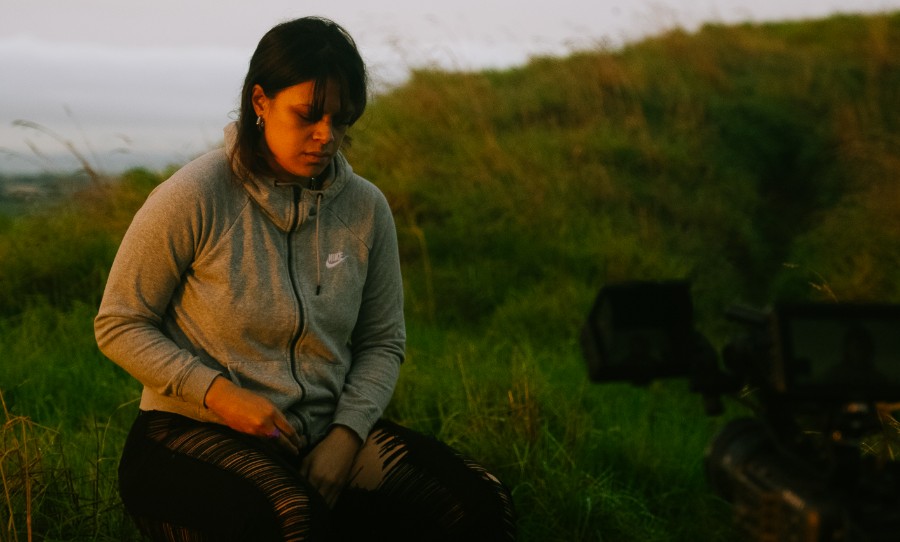“The letting go of art is the process that makes you better; a song doesn’t finish just because you release it, it continues to grow”
Aotearoa’s own R&B songstress Pati AF, (formally Disciple Pati), is back with her latest single ‘Acceptance’.
The track is a raw exploration of self-worth and resilience balanced alongside beautiful harmonies and melodic guitar riffs.

Drawing inspiration from modern poets H.E.R, SZA and Erykah Badu, her lyrical genius shines through her music.
Unafraid to be vulnerable in her creative process, she puts her all into her music. Each track Pati produces takes listeners on a journey unlike anything else.
We sat down to chat with the up and coming R&B star about balancing the vulnerability of creating music with the publicity of being a performing artist.
Read the full interview with Pati AF below and scroll down to listen to her new single ‘Acceptance’.
HAPPY: What are you up to today?
PATI AF:: I’m currently in Wellington, with my little sister and cousin – taking some time out to rest, fighting the Wellington Wind, and trying to keep warm.
HAPPY: Tell us a little about where you live? What do you love about it?
PATI AF: I live in South Auckland, Mangere Bridge, New Zealand. This suburb and area is so important and close to my heart – I grew up here. It’s a predominantly Pacific Island dominated area, so even though we’re not in Samoa, you have pockets of food, culture, and people that make it feel like home.
It’s also the longest place I’ve lived in; so it’s seen the best and worst of me. I’ve pissed in bushes and carparks, ran for busses, got into arguments with creeps, and just been an absolute little shit in this suburb.
HAPPY: How did you first become interested in music, and what motivated you to pursue it as a career?
PATI AF: Music is a big part of Samoan culture, and specifically in my family – from a young age, I was put in front of wedding crowds and funerals to sing for our family. I started working as a backing vocalist for Leza Corban after vocal lessons with her, and spent most of my teen years doing corporate gigs for cash.
It wasn’t until my friend Leaping Tiger asked me to write something for his beats, that I decided to start pursuing song-writing and recording.
Live performance, though, is still my first passion.
HAPPY: Can you describe your musical influences growing up and how they have shaped your sound today?
PATI AF: I grew up listening to a lot of dad-rock, which influenced the way I perform live, and the musical arrangements in our band. My writing however, was super influenced by RnB songstresses H.E.R, SZA, and Erykah Badu.
Their use of melodies, and poetry inspired a lot of my song-writing, and beat choices.
Nowadays, Auto Angel, the producer for this upcoming project, draws from a lot of hyperpop influences, mixing them with jazz chords for the production. A lot of the lyrics are inspired by poets like Tusiata Avia and Lana Lopesi.
HAPPY: What does a typical day in the studio look like for you? How do you approach the creative process when writing and recording new music?
PATI AF: It depends on the producer of the project – with Auto Angel, I wrote to beats online, specifically about the storyline of the project that I wanted.
After writing a number of songs, I sent those to Auto Angel who reproduced the production, and then we get into the studio and start focussing on vocal arrangement.
With other producers, like EDY, we set down, figure out a feeling and a reference, and then bang something out in a couple of hours.
My creative process, when writing a project, starts specifically with the story that I want to tell; I always think about what I want the audience to know, how much I want them to see my thought process, and what I want (or hope) they’ll take away from the final messaging.
The most important part for me, is expressing the feeling the situation gave – and finally, how it will translate into the live show.
HAPPY: Can you share the story behind your transition from Disciple Pati to Pati AF in 2023? What prompted the name change and how has it influenced your musical identity?
PATI AF: Disciple Pati was born out of my religious upbringing – I spent a lot of time singing in church. As with a lot of other artists, I used that name as a way to protect myself onstage, to hide myself away from the audience – especially because my music made me feel very vulnerable to the audience.
After some time away from the public eye, I decided to come out as myself. Pati is short for Sapati (meaning Sabbath in Samoan) – named after my uncle who was a musician in our family.
The AF is a double entendre – most of my audience believe it stands for “As Fuck”; which means to be the ultimate version of yourself, but it also stands for my last name “Apa-Fepulea’i”.
So, the change behind my stage name came from the acceptance of myself, and all my flaws – and deciding to share my story in all its ugliness, beauty, sadness and anger.
HAPPY: “Acceptance” has been described as a deeply personal song. How do you navigate the line between sharing your personal experiences through music and maintaining privacy?
PATI AF: I used to spend a lot of time in interviews and instagram captions explaining myself, my choices, my musical melodies and what everything means. This translated in to my own personal life, feeling like I owed people an explanation behind my choices, my mistakes and what I wanted to do with my life.
After choosing to be more vulnerable in performances, and creating stories with my music, I found out a lot of other young Pacific women also related to my story – the personal is the universal.
When I became more unapologetic about how I lived my own life as a musician, and as a Pacific woman, I learned to maintain privacy by being intentional about my music – always bringing the musical arrangement, the lyrics and live performance back to what it felt like.
After that, I leave it up to the audience to relate those parts back to their lives, and let them explain it for themselves, and explain myself no further.
As a story-teller, an “if you know, you know” attitude is so important to maintaining your privacy – the audience members who get and understand the feelings you’re portraying are the people that the story is for.
The story is not for those who demand more details and explanation to understand where you’re coming from – and remaining strong in that is important to knowing what to keep for yourself, and what to share.
HAPPY: How important is collaboration to your creative process? Are there any artists or producers you dream of working with in the future?
PATI AF: Collaboration is a huge part of the creative process; it helps you refine your story, articulate the feeling better – if you can’t explain what happened to someone else, how do you expect to properly articulate yourself through your music?
Working with Auto Angel has been a huge undertaking – they have helped me work through some of my own trauma through this process, and held so much space to help properly articulate the feelings through music.
My biggest dream is to work with artists like Hiatus Kaiyote and Tame Impala, who do so well to work melodies and poetry together. Working with collaborators who hold space for the story is so important to me; I’d love to work with kiwi artists like Jordyn with a Why, Paiges Space, Isla Noon, and Aaradhna.
HAPPY: What advice would you give to aspiring musicians who are just starting out on their own creative journeys?
PATI AF: JUST DO IT. There’s a perspective that artists are born and not made – but the best stories and music come from personal experience. Write your songs. Record them in whatever way they come, and release it.
The letting go of art is the process that makes you better; a song doesn’t finish just because you release it, it continues to grow and grow each time you perform it, each time someone new hears it, each time you rearrange it for a live audience.
Continue to breathe life into it beyond the recorded format.
HAPPY: Lastly, what makes you happy?
PATI AF: My family and performance. Always.



